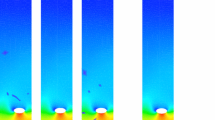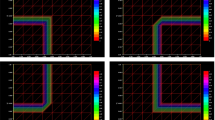Abstract
We present a residual-based a posteriori error estimator for the Hybrid High-Order (HHO) method for the Stokes model problem. Both the proposed HHO method and error estimator are valid in two and three dimensions and support arbitrary approximation orders on fairly general meshes. The upper bound and lower bound of the error estimator are proved, in which proof, the key ingredient is a novel stabilizer employed in the discrete scheme. By using the given estimator, adaptive algorithm of HHO method is designed to solve model problem. Finally, the expected theoretical results are numerically demonstrated on a variety of meshes for model problem.











Similar content being viewed by others
Data Availability
Date will be made available on reasonable request.
References
Verfürth, R.: A posteriori error estimation and adaptive mesh-refinement techniques. J. Comput. Appl. Math. 50(1–3), 67–83 (1994)
Babuška, I., Rheinboldt, W.C.: A-posteriori error estimates for the finite element method. Int. J. Numer. Methods Eng. 12(10), 1597–1615 (1978)
Babuška, I., Rheinboldt, W.C.: Error estimates for adaptive finite element computations. SIAM J. Numer. Anal. 15(4), 736–754 (1978)
Ainsworth, M., Oden, J.T.: A posteriori error estimation in finite element analysis. Comput. Methods Appl. Mech. Eng. 142(1–2), 1–88 (1997)
Grätsch, T., Bathe, K.-J.: A posteriori error estimation techniques in practical finite element analysis. Comput. Struct. 83(4–5), 235–265 (2005)
Dari, E.A., Durán, R.G., Padra, C.: A posteriori error estimates for non-conforming approximation of eigenvalue problems. Appl. Numer. Math. 62(5), 580–591 (2012)
Ghosh, S., Moorthy, S.: Elastic-plastic analysis of arbitrary heterogeneous materials with the Voronoi cell finite element method. Comput. Methods Appl. Mech. Eng. 121(1), 373–409 (1995)
Ghosh, S.: Micromechanical analysis and multi-scale modeling using the Voronoi cell finite element method, CRC Series in Computational Mechanics and Applied Analysis. CRC Press, Boca Raton (2011)
Martin, R.B., Burr, D.B., Sharkey, N.A., Fyhrie, D.P.: Skeletal Tissue Mechanics, 2nd edn. Springer, New York (2015)
Di Pietro, D.A., Ern, A.: Discrete functional analysis tools for discontinuous Galerkin methods with application to the incompressible Navier-Stokes equations. Math. Comp. 79(271), 1303–1330 (2010)
Cockburn, B.: Static condensation, hybridization, and the devising of the HDG methods. In: Building bridges: connections and challenges in modern approaches to numerical partial differential equations, Vol. 114 of Lect. Notes Comput. Sci. Eng., pp. 129–177. Springer, Cham (2016)
Cockburn, B., Di Pietro, D.A., Ern, A.: Bridging the hybrid high-order and hybridizable discontinuous Galerkin methods. ESAIM Math. Model. Numer. Anal. 50(3), 635–650 (2016)
Mu, L., Wang, J., Ye, X.: Weak Galerkin finite element methods on polytopal meshes. Int. J. Numer. Anal. Model. 12(1), 31–53 (2015)
Beirão da Veiga, L., Brezzi, F., Cangiani, A., Manzini, G., Marini, L.D., Russo, A.: Basic principles of virtual element methods. Math. Models Methods Appl. Sci. 23(1), 199–214 (2013)
Di Pietro, D.A., Ern, A., Lemaire, S.: An arbitrary-order and compact-stencil discretization of diffusion on general meshes based on local reconstruction operators. Comput. Methods Appl. Math. 14(4), 461–472 (2014)
Cangiani, A., Georgoulis, E.H., Houston, P.: \(hp\)-version discontinuous Galerkin methods on polygonal and polyhedral meshes. Math. Models Methods Appl. Sci. 24(10), 2009–2041 (2014)
Cockburn, B., Zhang, W.: A posteriori error analysis for hybridizable discontinuous Galerkin methods for second order elliptic problems. SIAM J. Numer. Anal. 51(1), 676–693 (2013)
Chen, L., Wang, J., Ye, X.: A posteriori error estimates for weak Galerkin finite element methods for second order elliptic problems. J. Sci. Comput. 59(2), 496–511 (2014)
Beirão da Veiga, L., Manzini, G.: Residual a posteriori error estimation for the virtual element method for elliptic problems. ESAIM Math. Model. Numer. Anal. 49(2), 577–599 (2015)
Di Pietro, D.A., Specogna, R.: An a posteriori-driven adaptive mixed high-order method with application to electrostatics. J. Comput. Phys. 326, 35–55 (2016)
Di Pietro, D.A., Ern, A.: A hybrid high-order locking-free method for linear elasticity on general meshes. Comput. Methods Appl. Mech. Eng. 283, 1–21 (2015)
Di Pietro, D.A., Droniou, J.: A hybrid high-order method for Leray-Lions elliptic equations on general meshes. Math. Comput. 86(307), 2159–2191 (2017)
Chave, F., Di Pietro, D.A., Formaggia, L.: A hybrid high-order method for Darcy flows in fractured porous media. SIAM J. Sci. Comput. 40(2), A1063–A1094 (2018)
Di Pietro, D.A., Krell, S.: A hybrid high-order method for the steady incompressible Navier–Stokes problem. J. Sci. Comput. 74(3), 1677–1705 (2018)
Zhang, Y., Mei, L., Li, R.: A hybrid high-order method for a coupled Stokes–Darcy problem on general meshes. J. Comput. Phys. 403, 109064, 23 (2020)
Calo, V., Cicuttin, M., Deng, Q., Ern, A.: Spectral approximation of elliptic operators by the hybrid high-order method. Math. Comput. 88(318), 1559–1586 (2019)
Abbas, M., Ern, A., Pignet, N.: A hybrid high-order method for incremental associative plasticity with small deformations. Comput. Methods Appl. Mech. Eng. 346, 891–912 (2019)
Burman, E., Cicuttin, M., Delay, G., Ern, A.: An unfitted hybrid high-order method with cell agglomeration for elliptic interface problems. SIAM J. Sci. Comput. 43(2), A859–A882 (2021)
Bank, R.E., Welfert, B.D.: A posteriori error estimates for the Stokes problem. SIAM J. Numer. Anal. 28(3), 591–623 (1991)
Dörfler, W., Ainsworth, M.: Reliable a posteriori error control for nonconformal finite element approximation of Stokes flow. Math. Comput. 74(252), 1599–1619 (2005)
Hannukainen, A., Stenberg, R., Vohralík, M.: A unified framework for a posteriori error estimation for the Stokes problem. Numer. Math. 122(4), 725–769 (2012)
Bao, F., Mu, L., Wang, J.: A fully computable a posteriori error estimate for the Stokes equations on polytopal meshes. SIAM J. Numer. Anal. 57(1), 458–477 (2019)
Wang, G., Wang, Y., He, Y.: A posteriori error estimates for the virtual element method for the Stokes problem. J. Sci. Comput. 84(2), Paper No. 37, 25 (2020)
Di Pietro, D.A., Droniou, J.: The Hybrid High-Order Method for Polytopal Meshes, Vol 19 of Modeling, Simulation and Application. Springer, Berlin (2020)
Dari, E., Durán, R., Padra, C.: Error estimators for nonconforming finite element approximations of the Stokes problem. Math. Comput. 64(211), 1017–1033 (1995)
Zheng, X., Xie, X.: A posteriori error estimator for a weak Galerkin finite element solution of the Stokes problem. East Asian J. Appl. Math. 7(3), 508–529 (2017)
Botti, M., Di Pietro, D.A., Guglielmana, A.: A low-order nonconforming method for linear elasticity on general meshes. Comput. Methods Appl. Mech. Eng. 354, 96–118 (2019)
John, V.: Finite element methods for incompressible flow problems. Springer Series in Computational Mathematics, vol. 51. Springer, Cham (2016)
Di Pietro, D.A., Ern, A.: Mathematical aspects of discontinuous Galerkin methods. Mathématiques & Applications (Berlin) [Mathematics & Applications], vol. 69. Springer, Heidelberg (2012)
Di Pietro, D.A., Tittarelli, R.: An introduction to hybrid high-order methods. In: Numerical methods for PDEs, Vol. 15 of SEMA SIMAI Springer Ser., pp. 75–128. Springer, Cham (2018)
Boffi, D., Di Pietro, D.A.: Unified formulation and analysis of mixed and primal discontinuous skeletal methods on polytopal meshes. ESAIM Math. Model. Numer. Anal. 52(1), 1–28 (2018)
Di Pietro, D.A., Ern, A., Linke, A., Schieweck, F.: A discontinuous skeletal method for the viscosity-dependent Stokes problem. Comput. Meth. Appl. Mech. Eng. 306, 175–195 (2016)
Wei, H., Huang, Y.: FEALPy: Finite Element Analysis Library in Python. Tech. rep., Xiangtan University. https://github.com/weihuayi/fealpy (2017–2021)
Houston, P., Schötzau, D., Wihler, T.P.: Energy norm a posteriori error estimation for mixed discontinuous Galerkin approximations of the Stokes problem. J. Sci. Comput. 22(23), 347–370 (2005)
Verfürth, R.: A posteriori error estimators for the Stokes equations. Numer. Math. 55(3), 309–325 (1989)
Arndt, D., Bangerth, W., Blais, B., Clevenger, T.C., Fehling, M., Grayver, A.V., Heister, T., Heltai, L., Kronbichler, M., Maier, M., Munch, P., Pelteret, J.-P., Rastak, R., Thomas, I., Turcksin, B., Wang, Z., Wells, D.: The deal.II library, version 9.2, J. Numer. Math
Acknowledgements
The authors should thank Huayi Wei from Xiangtan University, China, for the valuable discussions of the codes in FEALPy. The work is partially supported by the NSF of China (Nos. 12001433 and 12101495) and General Special Project of Education Department of Shaanxi Provincial Government (No. 21JK0943).
Funding
The authors have not disclosed any funding.
Author information
Authors and Affiliations
Corresponding author
Ethics declarations
Conflict of interest
The authors declare that they have no known competing financial interests or personal relationships that could have appeared to influence the work reported in this paper. Moreover, the preview version of this paper has been uploaded to arXiv, see https://arxiv.org/abs/2103.06556 for details.
Additional information
Publisher's Note
Springer Nature remains neutral with regard to jurisdictional claims in published maps and institutional affiliations.
Rights and permissions
Springer Nature or its licensor (e.g. a society or other partner) holds exclusive rights to this article under a publishing agreement with the author(s) or other rightsholder(s); author self-archiving of the accepted manuscript version of this article is solely governed by the terms of such publishing agreement and applicable law.
About this article
Cite this article
Zhang, Y., Mei, L. & Wang, G. A Posteriori Error Analysis of the Hybrid High-Order Method for the Stokes Problem. J Sci Comput 96, 74 (2023). https://doi.org/10.1007/s10915-023-02291-6
Received:
Revised:
Accepted:
Published:
DOI: https://doi.org/10.1007/s10915-023-02291-6




